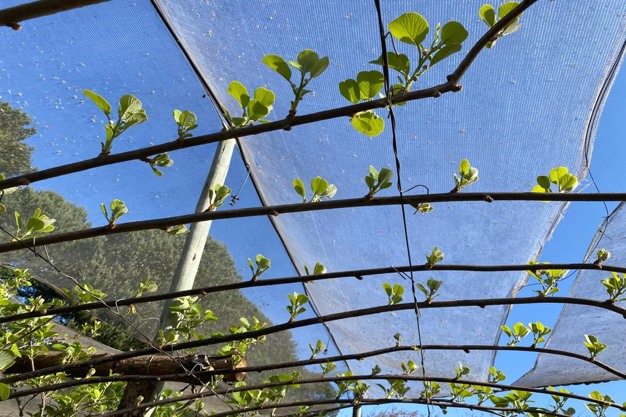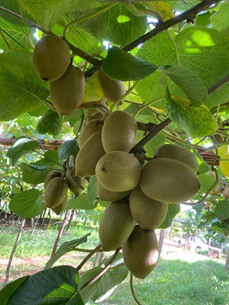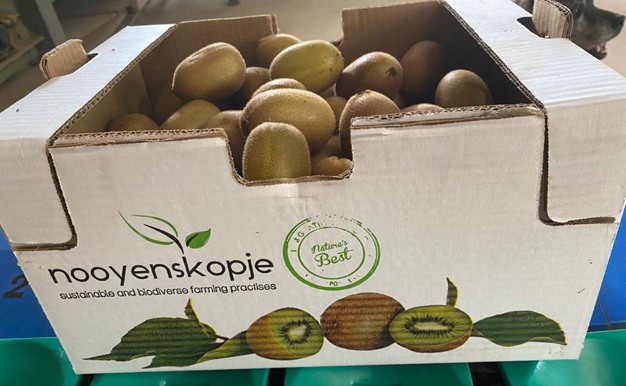The labour of applying budbreak chemicals to every node expected to start flowering at the end of this month – each kiwi plant pruned to approximately 32 canes of 2.5 metres in length, with nodes along every 75mm to 100mm – is done. Now, says farmer Danie Meyer of Nooyenskopje in Magoebaskloof, Limpopo Province, the pleasant wait for next year's kiwi crop starts.
With flowering comes the need for many bee hives – he keeps fifty hives on the farm, and brings in more besides: when it comes to pollination, there are no shortcuts. Good pollination means good sizing, while the inverse is also true. Kiwi pollen has become, he quips, "about as expensive as cocaine"; they harvest their own pollen from the males also woken up this time of the year.
 Excellent spring bud on Nooyenskopje's kiwi vines.
Excellent spring bud on Nooyenskopje's kiwi vines.
Extraordinary prices for 2023's low green kiwi crop
"A farmer is always optimistic, and we always expect that next year will be better," he says, "and so I know that next season will definitely be a better one!" In a rejuvenation drive since his daughter and son-in-law joined the family business five years ago, a 650m2 packhouse has been built on Nooyenskopje farm and the kiwis grown on 12 hectares are now loaded at-source. In two years, an additional 3.5 ha will add to the size of Nooyenkopje's kiwi crop.
The past season brought green kiwi prices which he calls "phenomenal"; prices the likes of which they've never seen on the local market, and it held right through the season because of the 30% drop in kiwi volumes. This, in turn, was the result of sub-par cold units during the winter of 2022, Meyer says. Thus far, the current winter has yielded below the 800 to 1,000 cold units they need, but it's been, at least, colder than the previous winter.
"This year we received R75, almost R80 [4 euros] per kilogram for green kiwis at the Johannesburg market - the best prices we've ever received locally for green kiwis. And it continued right up to the end of the season, because of the ratio between low supply and higher demand."
It is interesting to note, he points out, that the kiwi crop was lower everywhere in the Southern Hemisphere, and for the same reason as in South Africa.
Keeping South Africa in kiwis Nooyenskopje is the national kiwi supplier of Freshmark, Checker's fresh division, supplying in total 943 Shoprite, Checkers and Checkers Hyper stores across South Africa. "We have kiwis available for a very long period from March through to June because that's what Checkers is looking for: consistency."
Nooyenskopje is the national kiwi supplier of Freshmark, Checker's fresh division, supplying in total 943 Shoprite, Checkers and Checkers Hyper stores across South Africa. "We have kiwis available for a very long period from March through to June because that's what Checkers is looking for: consistency."
Nooyenskopje supplies Checkers with green, red and yellow kiwis (right), as well as kiwiberries, but it bears repeating that as far as South Africans are concerned, there's but one kiwi and that's the familiar Hayward green kiwi.
Every kiwi picked at Nooyenskopje has an address waiting for it, mostly within the country's borders, but a fraction of around 12% are flown out to a hand-picked group of end users in The Netherlands, Saudi Arabia, Hong Kong and Singapore, select volumes to clients with whom Meyer has a direct relationship; he aims to reduce the number of intermediaries who influence the eventual price that the farmer has to accept.
Meyer has no exposure to the harbours at all; everything exported is flown or trucked out.
He keeps a foot at the Gauteng fresh produce markets, supplying Alex Christodolides at GROW Botha Roodt at the Johannesburg market to whom Nooyenskopje has been sending kiwifruit since 1994, and some pallets to the Tshwane market, often on direct order for buyers who'll collect the fruit from the market and put it on a plane to proximal countries like Mauritius, Madagascar and Kenya.

Unrealistic expectations of yellow kiwi exports
Yellow kiwi varieties have been a hot topic in South Africa, with interest fanned by cultivar agents who create what Meyer calls "sometimes unrealistic expectations" among farmers around the price and yield per hectare of these varieties.
Yellow varieties are harvested six weeks before New Zealand in South Africa, or that's the plan, he remarks, but in reality New Zealand's yellow kiwi crop has been earlier over the past two years while delays at South Africa's ports can add to travel time.
"Growers can get carried away with the promises of being paid in foreign currencies, but there are many other factors besides that determine the success of fruit exports."
South African yellow kiwis are harvested during a short and intense period during March by most growers and together exported through one or two agents. The model leaves growers with very little control over how their material is handled, he says, and if in-transit temperatures are not well-controlled at the preferred +0.5°C, a whole consignment of kiwis is at risk of having a large percentage of soft fruit.
Costly post-arrival regrading of soft fruit will be for the grower's bill, priced in Dollars or euros. Meyer says agents are always eager to export, except when in-transit problems crop up, in which case they abnegate all responsibility.
Meyer further posits that the farmer takes all the risk and provides a year's input cost, yet waits between three and four months to receive an amount of which he or she can never be certain.
During the previous season, he says, some yellow kiwi growers have had to accept a farmgate price barely enough to pay for the packing cost. "Shocking prices which, as far as I've heard, are at least this season a bit better but not close to the promises made and the expectations created around yellow kiwis." For more information:
For more information:
Danie Meyer
Nooyenskopje
Tel: +27 82 568 3224
Email: [email protected]










